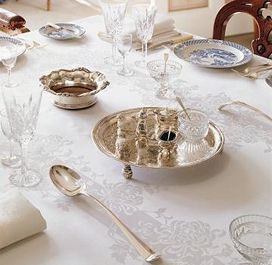 |
 |
 |
Damask fabric - a very special clothSingle or double damask – what's the difference? Read on...
To the specialist, it is a figured fabric made from one warp and one weft in which, generally, warp-satin and weft-sateen weaves interchange. Whether or not the technical explanation adds to your understanding, the process creates a pattern that is visible when viewed at certain angles. Across a large damask tablecloth, for example, the cloth can be quite extraordinary with new designs appearing as light sources vary or move. The fabric's name is derived from Damascus, the capital of Syria, once the centre of the cloth trade between the East and West. This is where Marco Polo discovered the glossy and durable textile in the 13th century. The quality of this lustrous cloth was immediately recognised. It was soon being imported into Rome, initially for use in the clergy's ceremonial wear. Later, it became integrated into the dress fashions of Europe's wealthier citizens and some lucky souls even got to enjoy a luxury sleep on damask bedding.
Double or Single damask?There is a common perception that the 'double' version of Damask fabric is superior to the single. It isn't so. Another belief is that double damask pattern is recognisable because it shows on both sides. But damask fabric is always reversible, so the same could be said of single. The fact is that the terms 'single' and 'double' are weaving terms, not standards of quality. Single damask woven from yarns containing finer, longer fibres will be of a higher quality than a 'double' cloth woven from yarns containing a mixture of short and long fibres. 'Double' cloth has a lower warp thread than weft thread count. It is woven by passing threads over seven warp threads and under one warp thread. Because the weft yarns are closed up tight in the fabric, a dense high-thread count fabric is produced. This means it takes longer to weave a piece of fabric, which in turn make it a more expensive way to manufacture.
Irish DesignsI'd guess that few homes in Ireland don't have a damask tablecloth or set of serviettes in the linen cupboard. This isn't just because damask is beautiful; it's also practical. It washes well, it's moth proof and it can be stored without losing its lustre. Among the most popular designs are the Chrysanthemum, the Shamrock, and Celtic patterns. A 'single' cloth woven from yarns containing finer, longer fibres will be of a higher quality than 'double' fabric woven from yarns containing a mixture of short and long fibres. Double damask does not, therefore, mean double weight, extra strength or superior value, so do not allow the terms 'double' and 'single' to influence you when you wish to make a purchase.
| ||
|
|
||
|
| Home Page | Disclaimer | Contact |Sitemap|Privacy Policy|
By Claire Santry, Copyright©
2008-2020 Irish-Genealogy-Toolkit.com. Dedicated to helping YOU discover your Irish Heritage.
|
||
